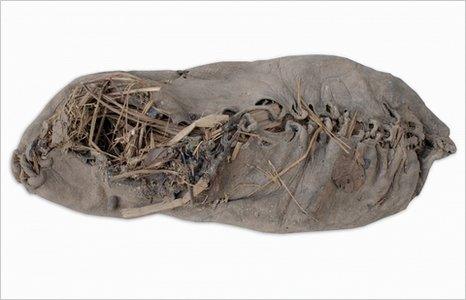'Oldest leather shoe' discovered
- Published

The ancient shoe was preserved under a layer of sheep dung
The oldest example of a leather shoe has been discovered by archaeologists in a cave in Armenia.
At 5,500 years old, the well preserved cow-hide shoe pre-dates Stonehenge by 400 years and the Pyramids of Giza by 1,000 years.
It was made of a single piece of leather and was shaped to fit the wearer's foot, the researchers say.
They have published details of the discovery from south-east Armenia in the journal Plos One.
The shoe contained grass, although the archaeologists are uncertain as to whether this was to keep the foot warm or to maintain the shape of the footwear.
The authors are unsure whether it was worn by a man or a woman. The shoe is relatively small, corresponding to a UK women's size 5 (European size 38; US size 7 women), but it could have been worn by a man of that period.
It was discovered at the Areni-1 cave in the Vayotz Dzor province of Armenia, which borders on Turkey and Iran.
The archaeologists put the shoe's remarkable preservation down to the stable, cool and dry conditions in the cave and the fact that the floor of the cave was covered by a thick layer of sheep dung.
This layer of excrement acted as a solid seal, preserving it over the millennia.
"We thought initially that the shoe and other objects were about 600-700 years old because they were in such good condition," said co-author Dr Ron Pinhasi from University College Cork in Ireland.
"It was only when the material was dated by the two radiocarbon laboratories in Oxford and in California that we realised that the shoe was older by a few hundred years than the shoes worn by Oetzi the Iceman."
Other well preserved objects were also found in the cave, including large containers, many of which held wheat and barley, apricots and other edible plants.
Sandals made from plant fibres found at the Arnold Research Cave in Missouri, US, pre-date the shoes from Areni by some 2,000-2,500 years.